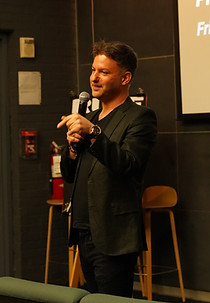TAL S. SHAMIR BIO
Tal S. Shamir (Ph.D.) has directed, produced, written, and edited dozens of short films that have been presented at a wide range of film festivals, galleries, and museums; he has won many awards, including a Gold Medal in the Academy of Motion Pictures Arts and Sciences' 2011 Student Oscars, for his film The Vermeers.
As part of his MA in film studies, Tal also co-created and co-produced the RUFF CUTS and FINE CUTS film showcases, which allowed film students to share, discuss, and improve their films. This platform has become the central ongoing film screening event of the School of Media Studies at The New School.
Tal holds a Ph.D. in philosophy, film, and media from the European Graduate School (Summa Cum Laude). His Cinematic Philosophy book (based on his dissertation), was published as a monograph by Palgrave Macmillan/Springer. Cinematic Philosophy has become one of the most notable books on film and philosophy.
Parallel to his work and studies in film, Tal was a team leader for 10.5 years in the JDC, the largest American Jewish humanitarian aid organization.
Tal wrote four feature-length screenplays: XPOSURE (2015), DEUS X MACHINA (2017), CONTROL (2019), Subliminal (2021); as well as two TV Series pilots/bibles titled THE EYE (2018) and SWIM LION (2020).
Tal teaches film and media at The New School University in NYC and serves as the head faculty producer for the RUFF CUTS and FINE CUTS film festival shows at The New School.
Tal recently completed the first season of a short-form documentary series titled “The Visual Revolution.” The series investigates our dramatic and under-the-radar transformation from a written-based culture to a visual-based culture through a unique visual style.
Tal is currently in pre-production of a documentary series based on his book Cinematic Philosophy.













